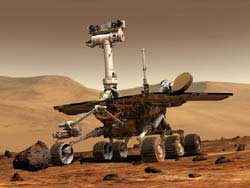|
Archive: January 4, 2004
|
Do you think the U.S. two-party system is optimal? I don't. It would be great if there were more points of view represented, more opportunity for candidates with a unique perspective which don't naturally fit into either mainstream party.
The biggest problem with the two-party system is exemplified by the current debates among Democratic presidential candidates over "who is the most electable". The implication is that any Democrat capable of defeating George Bush in 2004 is better than any other candidate who is not. The most important thing, in other words, is for a Democrat to win, not who they are, or what they think, or what they propose to do if elected. This is quintissential two-party thinking, and it works against any innovation.
If you agree, you might ask "what can be done?" The basic problem is that U.S. elections are won by a majority vote. In order to win, you have a have a majority. If there are small parties who have views which differ significantly from either of the two dominant parties, there is virtually no chance their candidates can get elected, because of the "majority wins" characteristic. One way around this is to have proportional representation. If there are ten representatives for a given {city, district, county, state}, instead of dividing the {city, district, county, state} into ten regions, with a representative for each region elected by majority vote, let people make ten votes for ten candidates. The top ten candidates receiving votes win. This way even a minority candidate with a strong following can be elected.
This idea also prevents gerrymandering, which has gone completely out of control in many states.
This idea also helps under-represented minorities such as racial, ethnic, or social groups to get representation.
If this proportional voting were used to select electors for the electoral college, don't you think we'd have a much wider range of candidates running? Candidates would be free to think and say and propose policy according to what they actually believe, instead of pandering to their party's "middle" in order to get elected.
Well, it was just a thought :)
|
|
I had an academic appreciation that it is complicated to send a rover like Spirit to Mars, but until watching this animation I didn't appreciate how complicated. What a terrific project! It makes me proud, once again, to be an American. (And also to be an alumnus of Caltech, whose Jet Propulsion Laboratory is responsible for NASA's unmanned missions.)

(click for animation)
This animation is fabulous and awe-inspiring. By all means check it out! [ via Joi Ito ]
Also, you might want to visit the JPL website, they have a ton of great Mars pictures, animations, and discussions...
|
|
Great football today, eh? The Green Bay win in OT against Seattle was a classic! And the Sugar Bowl was a great game. I was rooting for LSU, because of Oklahoma's disasterous loss against Kansas State, and so now we have a split NCAA championship; USC wins the AP poll on the strength of their victory in the Rose Bowl against Michigan, and LSU wins the coaches poll by winning the BCS. So be it.
 Mars rover Spirit continues to do well, and wakes up to a new day. I love the coverage of the Mars missions in the blogosphere; there is so much good stuff out there. Like Susan Kitchens' blog, and the raw images on the JPL website... Mars rover Spirit continues to do well, and wakes up to a new day. I love the coverage of the Mars missions in the blogosphere; there is so much good stuff out there. Like Susan Kitchens' blog, and the raw images on the JPL website...
Paul Graham on What You Can't Say. A great discussion about the fashions in forbidden thoughts. "To see fashion in your own time, though, requires a conscious effort... How can you see the wave, when you're the water?" Great stuff.
Scott Raymond thinks BitTorrent + RSS = Tivo. "Gillmor's vision is upside down: we shouldn't use BitTorrent to carry RSS, we should use RSS to carry BitTorrent. The beauty is that this synergy can so easily be realized. You can start publishing RSS feeds of BT files today: just point to a .torrent file in the element." Fascinating. I wonder what Adam Curry will make of this; it seems to have the benefit of RSS enclosures without the server-side overhead. [ via Matt Haughey, who comments "Of course, the legal issues around this type of technology would kind of make it impossible to do for very long, but it's perhaps a glimpse into the future of where entertainment could be going." ]
[ Later: Slightly different formulation from Scott and Matt. The <enclosure> of RSS items could be the URL of a .torrent file. That way enclosure-aware aggregators can retrieve the media - with BitTorrent - before you "read" the item. BT makes it more efficient to download a big media file, but it still takes time. The difference is putting the .torrent in the <link> makes downloading discretionary (you click the link if you want the file), putting it in the <enclosure> makes it "free". :) ]
Interesting article in the Seattle Times about cheap consumer electronics, like $40 DVD players. Explains how they can be so inexpensive (they're made overseas from commodity components) and the drawbacks (less features, low reliability, can't be repaired). Overall it is amazing. For one thing, every DVD and CD drive contains a laser, thirty years ago any laser was a major, expensive piece of electronics.
Of course, now they're pet toys :)
|
Return to the archive.
|


|




